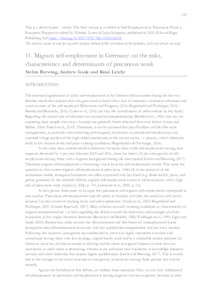|
Migrant self-employment in Germany: on the risks, characteristics and determinants of precarious work
Berwing, Stefan
;
Isaak, Andrew
;
Leicht, René
![[img]](https://madoc.bib.uni-mannheim.de/52837/1.hassmallThumbnailVersion/BerwigIsaakLeicht_2019_MigrantSelfEmploymentinGermany.pdf)  Vorschau |
|
PDF
BerwigIsaakLeicht_2019_MigrantSelfEmploymentinGermany.pdf
- Veröffentlichte Version
Download (530kB)
|
|
DOI:
|
https://doi.org/10.4337/9781788115032.00018
|
|
URL:
|
https://madoc.bib.uni-mannheim.de/52837
|
|
Weitere URL:
|
https://www.elgaronline.com/view/edcoll/9781788115...
|
|
URN:
|
urn:nbn:de:bsz:180-madoc-528372
|
|
Dokumenttyp:
|
Buchkapitel
|
|
Erscheinungsjahr:
|
2019
|
|
Buchtitel:
|
Self-employment as precarious work : a European perspective
|
|
Seitenbereich:
|
186-214
|
|
Herausgeber:
|
Conen, Wieteke
|
|
Ort der Veröffentlichung:
|
Cheltenham , Northampton
|
|
Verlag:
|
Edward Elgar Publishing
|
|
ISBN:
|
978-1-78811-502-5 , 1-78811-502-3 , 978-1-78811-503-2
|
|
Sprache der Veröffentlichung:
|
Englisch
|
|
Einrichtung:
|
Fakultät für Betriebswirtschaftslehre > Mittelstandsforschung u. Entrepreneurship (Woywode 2007-)
Außerfakultäre Einrichtungen > Institut für Mittelstandsforschung (ifm)
|
|
Lizenz:
|
 Creative Commons Namensnennung 4.0 International (CC BY 4.0)
Creative Commons Namensnennung 4.0 International (CC BY 4.0)
|
|
Fachgebiet:
|
300 Sozialwissenschaften, Soziologie, Anthropologie
330 Wirtschaft
650 Management
|
|
Freie Schlagwörter (Deutsch):
|
Migranten , Selbstständigkeit , Geflüchtete , Mikrozensus , Prekaritöät
|
|
Freie Schlagwörter (Englisch):
|
Migrant , Self-Employment , Refugee , Germany , Precarious Work , Microcensus
|
|
Abstract:
|
The prospect of ‘being your own boss’ is prominently featured both within academia and general public discourse. While self-employment is often associated with independent entrepreneurship, it has increasingly become a form of precarious work and therefore a serious challenge for modern societies based on the welfare state. At the same time, researchers in Western Europe leave the question largely unanswered as to what degree entrepreneurship is precarious, particularly among disadvantaged groups. This is partly because a standardized operationalization of precarious work is lacking.
In this study, we examine the extent of precarious migrant self-employment vis-à-vis natives nationally using data from the German Microcensus, while simultaneously introducing a replicable operationalization for precarious work. Using this paradigm, we indeed uncover a higher effect of migrants on precariousness overall, confirming the common narrative about migrant entrepreneurship in public discourse. Every fourth migrant self-employed works under precarious conditions, while this is the case only for every fifth German native. This difference however, is not very large (6 percent). Taking post-Fordism into account, we cannot prove that migrants are especially prone to be the subject of post-Fordist work arrangements. However, our data provide firm evidence for the assumption of many scholars that cultural professions often lead to precarious working conditions. Our results are more likely to replicate those European countries with comparable socio-economic context and immigration history, for example Austria or Switzerland.
|
 | Dieser Eintrag ist Teil der Universitätsbibliographie. |
 | Das Dokument wird vom Publikationsserver der Universitätsbibliothek Mannheim bereitgestellt. |
 Suche Autoren in Suche Autoren in
Sie haben einen Fehler gefunden? Teilen Sie uns Ihren Korrekturwunsch bitte hier mit: E-Mail
Actions (login required)
 |
Eintrag anzeigen |
|
 ORCID: 0000-0001-5822-4355 ; Leicht, René
ORCID: 0000-0001-5822-4355 ; Leicht, René



 Creative Commons Namensnennung 4.0 International (CC BY 4.0)
Creative Commons Namensnennung 4.0 International (CC BY 4.0)
 Suche Autoren in
Suche Autoren in